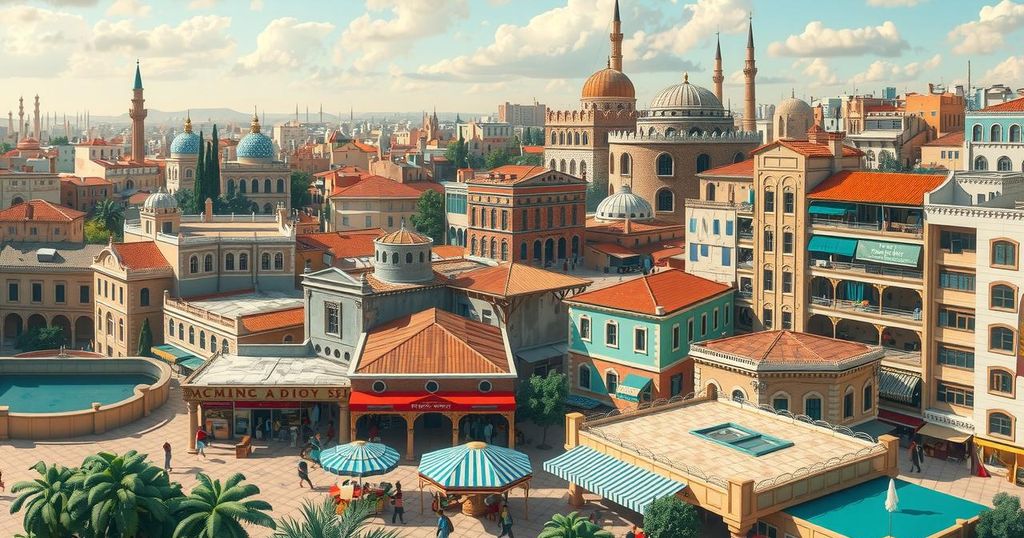Weiser Diplomacy Center Discusses Syria’s Reconstruction Post-Civil War

The Weiser Diplomacy Center at the University of Michigan hosted a discussion led by Qutaiba Idlbi and Dr. Abdalmajid Katranji on the post-civil war reconstruction of Syria. The talk addressed the aftermath of the Syrian civil war, the establishment of new governance under Ahmed al-Sharaa, and the ongoing challenges, including criticism of U.S. sanctions and the necessity for civic organization in rebuilding efforts.
The Weiser Diplomacy Center at the University of Michigan welcomed Qutaiba Idlbi and Dr. Abdalmajid Katranji for a discussion regarding the reconstruction of Syria following the civil war. This event focused on the repercussions of the 14-year conflict, the strategies of the new Syrian government, and the obstacles currently hindering the country’s reconstruction efforts.
The regime of Bashar al-Assad was overthrown on December 8, 2024, after enduring a prolonged stalemate in the civil war. Subsequently, Ahmed al-Sharaa, also known as Abu Mohammed al-Julani, leader of the Hay’at Tahrir al-Sham group, assumed leadership of Syria.
During the discussion, Idlbi highlighted the extensive devastation inflicted by the civil war, particularly noting the significant brain drain resulting from the mass exodus of educated individuals. He elaborated, stating, “There’s a lot for Syrians to rebuild; half of Syria has left the country,” characterizing the current situation as one of the greatest brain drains since World War II.
Despite the civil war’s fallout, Idlbi indicated that there exists a sense of joy among Syrians for their freedom from the oppressive regime of Assad. He remarked, “You can feel the hunger or see the hunger on people’s faces, but you can also see the smiles and the joy on their faces that they are finally free.”
Sharaa has faced criticism in the West due to his historical ties to Al-Qaeda. However, both Idlbi and Katranji contended that Sharaa has severed these ties and is now combating both ISIS and Al-Qaeda. Katranji reflected on his humanitarian relief efforts in Idlib, underscoring the establishment of civic institutions focused on reconstruction, such as the White Helmets.
Katranji noted, “There was structure, there were institutions and that’s what’s critical to understand,” emphasizing the civic engagement that emerged independent of any political authority. He contrasted his humanitarian experiences in Idlib with those in Assad-controlled areas, where governance was dysfunctional, delaying rescue efforts.
Idlbi insisted that the civil war, while devastating, allowed Syrians to cultivate self-governing institutions that were previously stifled under Assad. He compared this to Iraq, where the swift removal of the Ba’ath party left a power vacuum without a viable government framework. “In Syria there was that gap where Syrians were able to come together,” he stated.
Idlbi emphasized the importance of sustained American involvement in Syria’s reconstruction, cautioning against an isolationist stance. He argued, “We can’t really escape who we are: We’re the empire of this era… They have built the Syrian Dream, which I believe is very similar to the American Dream.”
Katranji expressed concerns regarding lingering U.S. sanctions imposed through the Caesar Syria Civilian Protection Act, suggesting their removal is crucial for reconstruction. He warned that delaying action could create a new power vacuum. “If you wait too long, then another vacuum will be created, somebody else will step in,” he advised.
He called for rapid sanction removal, noting that global opinions, including those from the European Union and the United Nations, favor a relaxation of sanctions. “The next three months are absolutely critical in which we can engage our civic leadership here in the United States,” he stated.
Razaan Killawi, a senior at Michigan, expressed appreciation for the talk and stressed the importance of student engagement with on-the-ground reporting, urging the community to learn from Syrians. “I think it’s really meaningful when (students) can come to events led by Syrians…and see what is actually happening,” she remarked.
In summary, the event hosted by the Weiser Diplomacy Center provided valuable insights into the ongoing challenges and opportunities facing Syria after over fourteen years of civil war. Discussions led by Qutaiba Idlbi and Dr. Abdalmajid Katranji illuminated the nation’s need for reconstruction, the role of civic institutions, and the potential impact of international support and sanctions on rebuilding efforts. This dialogue highlighted the importance of understanding the journey toward overcoming a protracted conflict and the hope for a revitalized Syria.
Original Source: www.michigandaily.com








